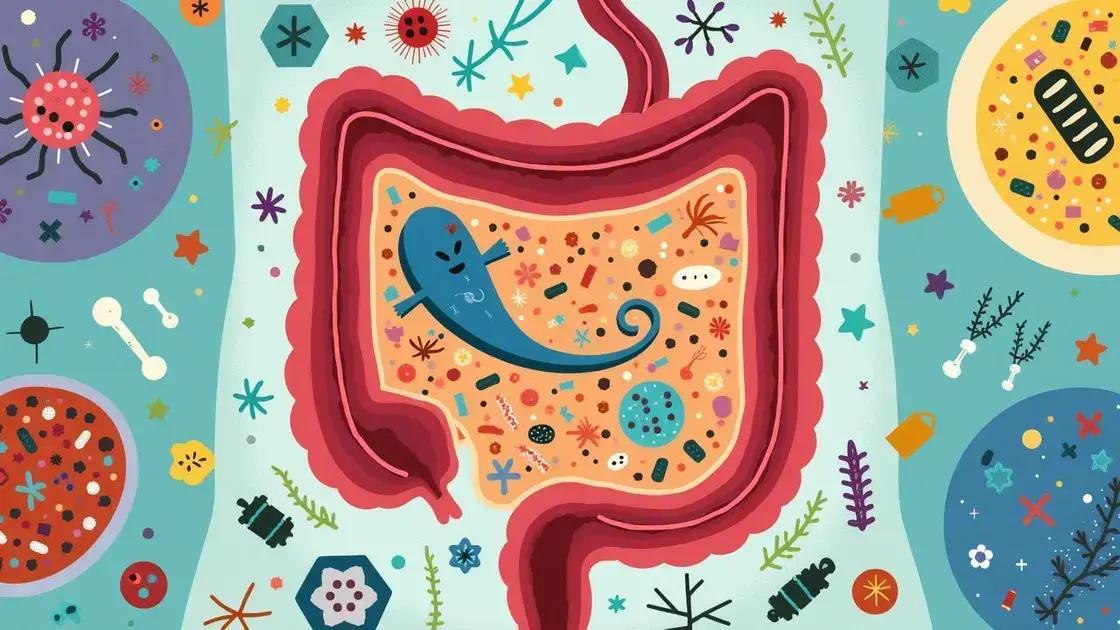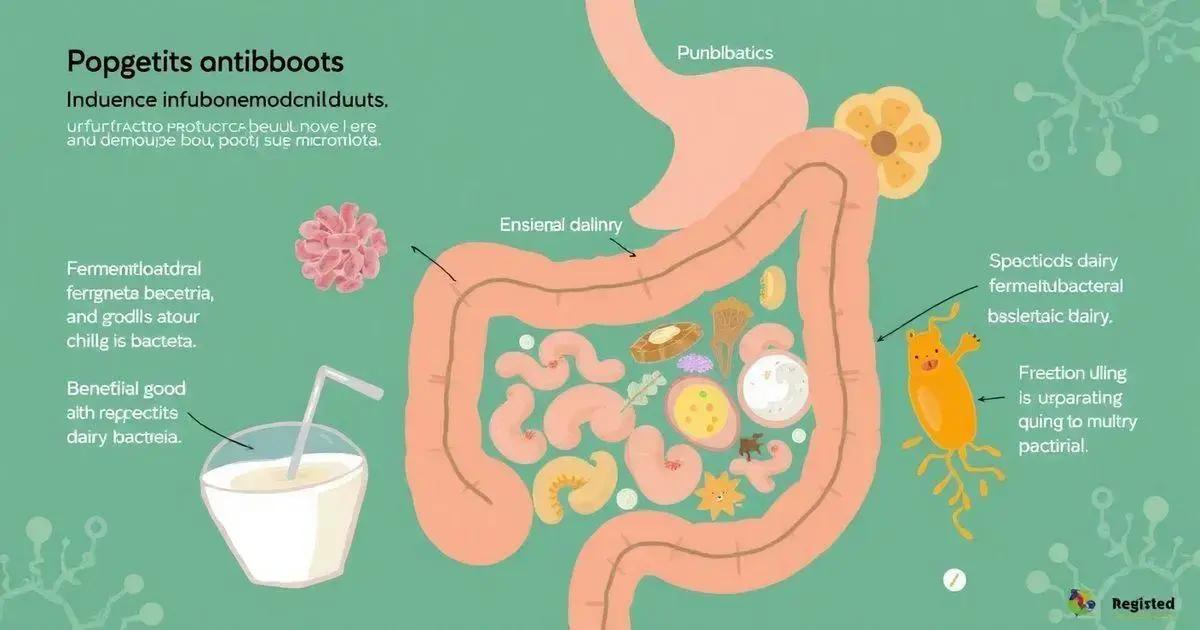The role of fermented dairy in gut microbiome health is significant as it provides probiotics that enhance digestion, boost immune function, and promote a balanced gut microbiota. Regular consumption of products like yogurt and kefir can lead to improved nutrient absorption and overall better digestive health.
The role of fermented dairy in gut microbiome health is gaining attention as research continues to uncover its benefits. Fermented dairy products, such as yogurt, kefir, and cheese, are rich in probiotics that support gut health. Consuming these foods can help maintain a balanced microbiome, promoting better digestion and overall wellness. In this article, we will discuss the importance of the gut microbiome, the specific benefits of incorporating fermented dairy into your diet, and practical tips for making these foods a regular part of your meals.
Understanding Gut Microbiome and Its Importance

The gut microbiome consists of trillions of microorganisms, including bacteria, viruses, fungi, and other microbes living in the digestive tract. Understanding gut microbiome and its importance is essential for overall health. These microorganisms play crucial roles in digestion, immune function, and even mental health.
Importance of Gut Microbiome
One of the most vital functions of the gut microbiome is its role in digestion. It helps break down complex carbohydrates and fibers that the human body cannot digest on its own. This process produces short-chain fatty acids (SCFAs), which provide energy to cells and maintain gut health.
Impact on Immune System
The gut microbiome also supports the immune system. It helps train immune cells and produces substances that inhibit harmful pathogens. A diverse and balanced gut microbiome can reduce inflammation and lower the risk of chronic diseases.
Connection to Mental Health
Emerging research indicates a strong connection between the gut and brain, often referred to as the gut-brain axis. Mood-regulating neurotransmitters are produced in the gut, highlighting the importance of gut health in mental wellbeing.
Maintaining a Healthy Microbiome
Maintaining a healthy gut microbiome is essential. Factors such as diet, lifestyle, and antibiotic use can influence its balance. Eating a variety of foods, particularly those rich in probiotics and prebiotics, can support the diversity of gut bacteria.
Benefits of Fermented Dairy for Gut Health

Fermented dairy products, such as yogurt and kefir, offer several benefits for gut health. These foods are rich in probiotics, which are live bacteria that provide health benefits when consumed in adequate amounts.
Promotes Healthy Digestion
One of the primary benefits of fermented dairy is its ability to promote healthy digestion. Probiotics in these products help break down food more effectively. They also assist in balancing the gut microbiome, preventing digestive issues such as bloating and constipation.
Enhances Nutrient Absorption
Fermented dairy can enhance the absorption of essential nutrients. The fermentation process helps release vitamins and minerals, making them easier for the body to absorb. For example, fermented dairy is often richer in B vitamins, calcium, and magnesium.
Boosts Immune Function
Consuming fermented dairy can boost the immune system. Since a large part of our immune system resides in the gut, maintaining gut health through probiotics is crucial. Studies have shown that regular intake of fermented dairy can help decrease the incidence of infections and improve immune response.
Supports a Healthy Microbiome
Regular consumption of fermented dairy helps maintain a balanced gut microbiome. A diverse microbiome is key to preventing symptoms of digestive disorders and promoting overall well-being. Incorporating these foods into your diet increases the variety of beneficial bacteria in your gut.
How Fermented Dairy Influences Gut Microbiota

Understanding how fermented dairy influences gut microbiota is vital for overall health. Fermented dairy products contain live probiotics, which help populate the gut with beneficial bacteria.
Probiotics and Their Role
Probiotics in fermented dairy, such as Lactobacillus and Bifidobacterium, play a key role in balancing gut microbiota. They can inhibit harmful bacteria and promote the growth of good bacteria. This balance is critical for optimal digestive health.
Changing Gut Composition
When consumed regularly, fermented dairy can change the composition of gut microbiota. It encourages diversity among bacterial species, which is important for a healthy gut ecosystem. A diverse microbiome is associated with reduced risk of diseases.
Impact on Gut Health
Fermented dairy supports gut barriers, preventing harmful substances from entering the bloodstream. It strengthens the intestinal lining, improving gut permeability. Enhanced gut function can alleviate symptoms of IBS and other gastrointestinal disorders.
Interaction with Diet
The effects of fermented dairy on gut microbiota can be enhanced with a fiber-rich diet. Foods high in prebiotics, like fruits, vegetables, and whole grains, feed good bacteria and work synergistically with fermented dairy to support gut health.
Integrating Fermented Dairy into Your Diet

Integrating fermented dairy into your diet is easy and can be delicious. Here are some practical tips to include these beneficial foods in your meals.
Start Your Day with Yogurt
Begin your morning with a bowl of yogurt. You can add fresh fruits, nuts, and a drizzle of honey for extra flavor and nutrients. This simple breakfast is not only tasty but also provides a good dose of probiotics to kickstart your gut health.
Try Kefir as a Drink
Kefir is a fermented dairy drink that can be enjoyed on its own or added to smoothies. You can blend kefir with your favorite fruits and greens for a refreshing drink that is rich in probiotics. This makes a great snack or meal replacement!
Add Fermented Dairy to Recipes
You can use fermented dairy products like yogurt or sour cream in cooking. Try adding plain yogurt to dressings or as a topping for baked potatoes and tacos. This not only enhances flavor but also boosts the nutritional value of your meals.
Experiment with Cheese
Incorporate fermented cheeses into your diet. Cheese varieties, such as feta or aged cheddar, contain beneficial bacteria. Use them in salads, on sandwiches, or as a snack with whole-grain crackers to enjoy the health benefits.
The Importance of Fermented Dairy for Gut Health
In summary, understanding the role of fermented dairy in gut microbiome health is essential for anyone looking to improve their overall well-being. These products offer numerous benefits, such as promoting digestion, enhancing nutrient absorption, and supporting immune function.
Integrating fermented dairy into your diet is not only easy but also delicious. By including items like yogurt, kefir, and cheese in your meals, you can support a healthy gut microbiota and enjoy the numerous health benefits they provide.
As research continues to unveil the significance of the gut microbiome, fermented dairy will undoubtedly play a vital role in maintaining gut health and overall wellness.
FAQ – Frequently Asked Questions about Fermented Dairy and Gut Health
What are the benefits of consuming fermented dairy?
Fermented dairy offers multiple benefits, including improved digestion, enhanced nutrient absorption, and support for a healthy immune system.
How do probiotics in fermented dairy help gut health?
Probiotics in fermented dairy help maintain a balanced gut microbiome by promoting the growth of beneficial bacteria and inhibiting harmful ones.
How can I include fermented dairy in my diet?
You can include fermented dairy by adding yogurt to your breakfast, drinking kefir as a snack, or using cheese in salads and meals.
Is there a difference between yogurt and kefir?
Yes, yogurt is made by fermenting milk with specific bacteria, while kefir is fermented with a starter culture that contains a larger variety of beneficial microorganisms.
Can fermented dairy benefit those with lactose intolerance?
Many people with lactose intolerance can tolerate fermented dairy, as the fermentation process reduces lactose content and makes it easier to digest.
How often should I consume fermented dairy for health benefits?
For optimal gut health, it is recommended to consume fermented dairy regularly, aiming for a few servings each week.













